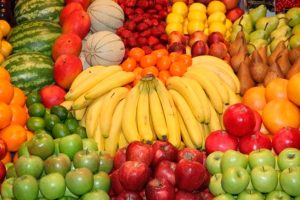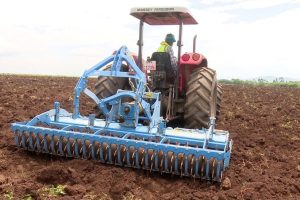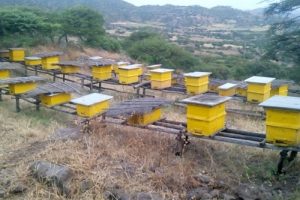
This is the main harvest season and a time of preparation for farmers to the next harvest period. Nowadays, harvest seasons have been increased in Ethiopia. Farming, which was normally done once a year in anticipation of winter, has now become accustomed to summer irrigation in many areas.
After harvesting the crops sown in autumn, the next irrigation is done. This irrigation therefore requires many inputs. Among these, the issue of soil fertilization is one that farmers have been tested by. It is known that the government has been making various efforts to address the fertilizer demand of the farmers. However, due to various reasons, soil fertilization has been a challenge for the farmers.
In countries like Ethiopia where national development and economy is based on agriculture, failure to meet the needs of the farmers causes many problems. If the farmers get out somehow today, the pressure it will put on the people tomorrow is not easy to estimate. Therefore, it is necessary to think ahead to meet the agricultural inputs needed by the farmers. That is why the Ministry of Agriculture has already bought soil fertilizer and is working hard to reach the farmers in order to prevent a repeat of last year’s problem.
Recently, the Ministry of Agriculture briefed journalists about soil fertilization. This concerns the pre-purchase of soil fertilizer which is urgent in Ethiopia. State Minister of Agriculture, Sophia Kassa (PhD) said that fertilizer procurement is done through the federal government. It will be done based on the potential of the country. Accordingly, it is planned to provide more than 23 million quintals of fertilizer for the 2023/24 crop season, but it is known that the country’s purchasing capacity for this year’s crop season is 19.4 million quintals of soil fertilizer that cost 930 million Dollar. Out of this, 14.79 million quintals of fertilizer has been purchased so far.
There are two types of fertilizers that are most in demand by farmers. They are NPS and Urea; but their usage is different. For example, during sowing season, NPS Boron is needed and it accounts for 60%. Urea, which the farmer uses when the crop reaches the budding season, covers 40%. She explained that out of the 19.4 million quintals of soil fertilizer, 8.2 quintals is urea and the remaining 11.19 million quintals is NPS.
According to the State Minister, last year, 12.8 million quintals were purchased; not including that was purchased for Tigray region. Compared to last year, there is a significant increase. This makes Ethiopia purchase the largest volume of fertilizer in its history. Apart from that, this crop season has also seen good performance by importing the soil fertilizer quickly.
As she said, the first ship arrived on December 28, 2022 last year. This year, however, the first ship loaded with 51,420 metric tons of urea arrived at Djibouti port in October 2023.
For the 2023/24 production season, up to 29 November, 2023; 207,295 metric tons of urea fertilizer arrived at the port of Djibouti, of which 104,304 metric tons of urea were transported to the country. She further explained that from 1st December to 14, 2023, three ships loaded with 174,500 metric tons of NPS Boron are expected to arrive in Djibouti.
As stated repeatedly, the State Minister explained that it was likely to make several improvements in terms of making the issue of soil fertilization available to the semi-pastoralists and farmers early. She mentioned that there are various reasons for this success. Among these reasons, the main ones are changing the existing purchasing policy; reorganizing the board of the Agricultural Works Corporation and establishing a technical committee; making purchases using different purchase options; and making purchases when the price of fertilizer is reduced.
In addition, the opening of 11 LCs, which has never happened before; identification of areas that need fertilizer for the irrigation, autumn and the main harvest seasons and purchase will ensure that the success is sustainable and guaranteed. At the current purchase rate, there is little left over for the harvest. For this reason, some purchases have been made recently. She said that the rest will be bought when the price of fertilizer is reduced.
According to the State Minister, the Ministry of Agriculture controls only the transportation from Djibouti to the central warehouse and the information provided is based on this. The price will be fixed by the government in order to ensure that the farmers purchase with the same price of the last two consecutive years in order to prevent the market price from increasing after the harvest. After that, cost of transportation, loading and unloading fee and warehouse rent will be added to the farmers upon arrival in the regions. Therefore, this year, as she believes, the farmers are not concerned about the price issue. They are given the opportunity to buy with the last two consecutive years’ price.
Saving is also seen during this production season’s fertilizer purchase. “Because,” the State Minister said; “We have reduced the burden of government subsidies by increasing our demand for fertilizers. Last year, we were given one billion dollars and it was possible to buy 12.8 million quintals, not including Tigray. This year, however, 930 million dollars have been allowed and up to 19.4 million quintals have been purchased. For this, the newly established technical committee negotiated with the suppliers and made the purchase possible. On the other hand, it has become profitable to buy fertilizer in anticipation of low prices.”
Another measure taken as to the State Minister is the work done to avoid improper transfer and exchange of fertilizers. This is a system that is monitored by the Ministry and ensures that the fertilizer reaches the farmers from Djibouti. She stated that it is to guarantee the delivery of fertilizer to the farmers. The main problem encountered in the last two consecutive years was, when they seized soil fertilizer that was being smuggled into the Amhara region, there was claim to be from Oromia and vice versa. Therefore, it was not possible to hold the smugglers and make accountable. But now, since it will be released with a code from the beginning, even if it is sold, it has a chance of being caught. Since the system also enhances accountability, it is being implemented this year, she said.
The State Minister stated that there is another practical work to be done during the same production period in connection with the supply of soil fertilizer, with the aim of bringing new regions into the system. Therefore, there will be regions that purchase soil fertilizers from the Agricultural Works Corporation. One is Afar region and the procurement from the central warehouse will be officially started. Next year, Gambella and Somali regions will be included in the purchase system.
She mentioned that regarding the distribution of fertilizer for the 2023/24 crop season, it is being done in consultation with the regions so that there is no security problem and the distribution is not disrupted. She stated that fertilizer is entering the regions even with convoy. Referring to the regions that take soil fertilizer widely, the Ministry compared it with last year. For Tigray region, 800,000 quintals was bought last year but this year, 700,000 quintals is bought. Similarly, Amhara and Oromia regions use the highest amount of soil fertilizer. Oromia region received 5.9 million quintals last year and this year, it received 8.92 million quintals. Amara region, which received 5.2 last year, will get 8.5 million quintals of soil fertilizer this season.
Despite the high increase in the price of fertilizer at the international level, the government has subsidized considering the capacity of farmers and semi-pastoralists. Referring to the data available in the last three consecutive years, she explained that the government has provided subsidies of 52 billion Birr. She said that the reason for this is that it is believed to have an irreplaceable role in stabilizing the market.
The State Minister mentioned that the implementation of these activities will solve many problems of which one is saving time and the other is avoiding rush to take fertilizer from the corporation and deliver it to the problem area. Fertilizer transportation from the region will not be done. They will get the soil fertilizer they need directly from their distribution center on time. She stressed that both regions and farmers should be aware of this and take action.
BY BACHA ZEWDIE
THE ETHIOPIAN HERALD WEDNESDAY 6 DECEMBER 2023





